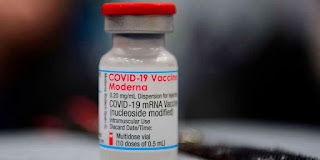Kenya has just received 880,460 doses of Moderna Covid-19 vaccines via Covax. The vaccines, a donation from the United States , arrived in the country at the Jomo Kenyatta International Airport on Monday morning.
Here’s what you need to know about the US-made jabs. Answers below are as explained by Dr Willis Akhwale, Kenya’s Covid-19 vaccine task force chairman, and as researched from the World Health Organization, the FDA, CDC and Nature Journal.
Why is Kenya getting Moderna vaccines?
The consignment is the first batch of over 1.7 million doses that will be donated by the US government. Along with AstraZeneca, Pfizer and J&J jabs (still to come), the Moderna vaccines are part of Kenya’s ambitious plan to vaccinate 10 million people by the end of 2021. Only 2.9 per cent of adult Kenyans are currently vaccinated.
The Moderna vaccine was approved by the US Food and Drug Administration on December 18 last year. While it was the first vaccine against Covid-19 to be tried on humans, it became the second, after Pfizer/BioNTech, to be approved by the European Union. On April 30 this year, the World Health Organization also approved it under the emergency use authorisation category. The Health ministry in Kenya, via the Pharmacy and Poisons Boards, has also approved it and assured Kenyans of its safety.
How effective is it against Covid-19?
The US Centres for Disease Control and Prevention (CDC) says evidence from clinical trials shows the Moderna vaccine is 94.1 per cent effective against coronavirus. This means that out of 10 people who got the Moderna jab, nine of them will not be severely affected by the disease.
However, as a caveat, the WHO says that effectiveness outside of clinical trials can differ. Already, fresh reports last week indicated that the effectiveness of some vaccines fades over time and this could necessitate booster shots.
Is the Moderna vaccine effective against the Delta variant?
According to Dr Akhwale, it does offer some protection.
Different studies from different clinical trials also shed light on its effectiveness. For instance, a study by Oxford University researchers, which is not yet peer-reviewed, says it does offer some protection from the Delta variant only that its effectiveness diminishes after some time.
In a separate Canadian study, the vaccine was capable of providing protection against the Delta variant and other variants tested, even though it was much more reduced compared with the Alpha variant.
How will I get the vaccine in Kenya?
The Health ministry says each of its listed health facilities has one type of vaccine (AstraZeneca). However, vaccine task force chair, Dr Akhwale, says that only facilities with a high number of people like the Kenyatta National Hospital will have the option of two types, that is, including Moderna. Before going to a vaccination centre, the Health ministry has advised people to use the ChanjoKE system to pre-register for facilities that have the Moderna vaccine. Choosing a particular vaccination post means that you will use the jab that is available there. See the list of centres in the portal.
The Health ministry has also increased vaccination centres from 800 to 3,000 and the updated list is available in the portal.
Where will the Moderna vaccine be stored?
Just like the Oxford AstraZeneca vaccine that has been in the country since March, the Moderna vaccine has also been taken to the national depot in Kitengela for storage. Moderna does not require special refrigeration. The CDC says that a standard freezer can store it as it has to be frozen at a range of -50°Celcius to -15°Celsius. Dr Willis Akhwale told the Nation that once the vaccine has thawed, it cannot be refrozen and has to be used within 30 days. This first batch will expire by the end of October and Kenyans have been asked to get their jabs before then.
Who should get the Moderna vaccine?
Health PS Susan Mochache said the priority list issued by the group still stands. Health workers, teachers, security personnel and the elderly have been advised to take the jab if they are yet to. In Kenya, young adults aged 18 and below are not yet eligible for the Moderna vaccine.
How will the Moderna vaccine be administered?
It will be given as a shot in the arm muscle as advised by a health care provider. The requirement is that one takes two doses of the Moderna vaccine which are given at intervals of four weeks. In other countries like the US, people with an impaired immune system are given a third dose of this vaccine. In Kenya, however, no guideline has been issued on whether people should get a third booster shot.
What are some of the side effects?
In the US where the vaccine has been largely administered, a study by the CDC showed that 90 per cent of the side effects were found to be unserious. Headaches had the most occurrence, followed by fatigue and dizziness. There were reports of rare cases of severe allergic reactions. BY DAILY NATION
There's no story that cannot be told. We cover the stories that others don't want to be told, we bring you all the news you need. If you have tips, exposes or any story you need to be told bluntly and all queries write to us [email protected] also find us on Telegram

